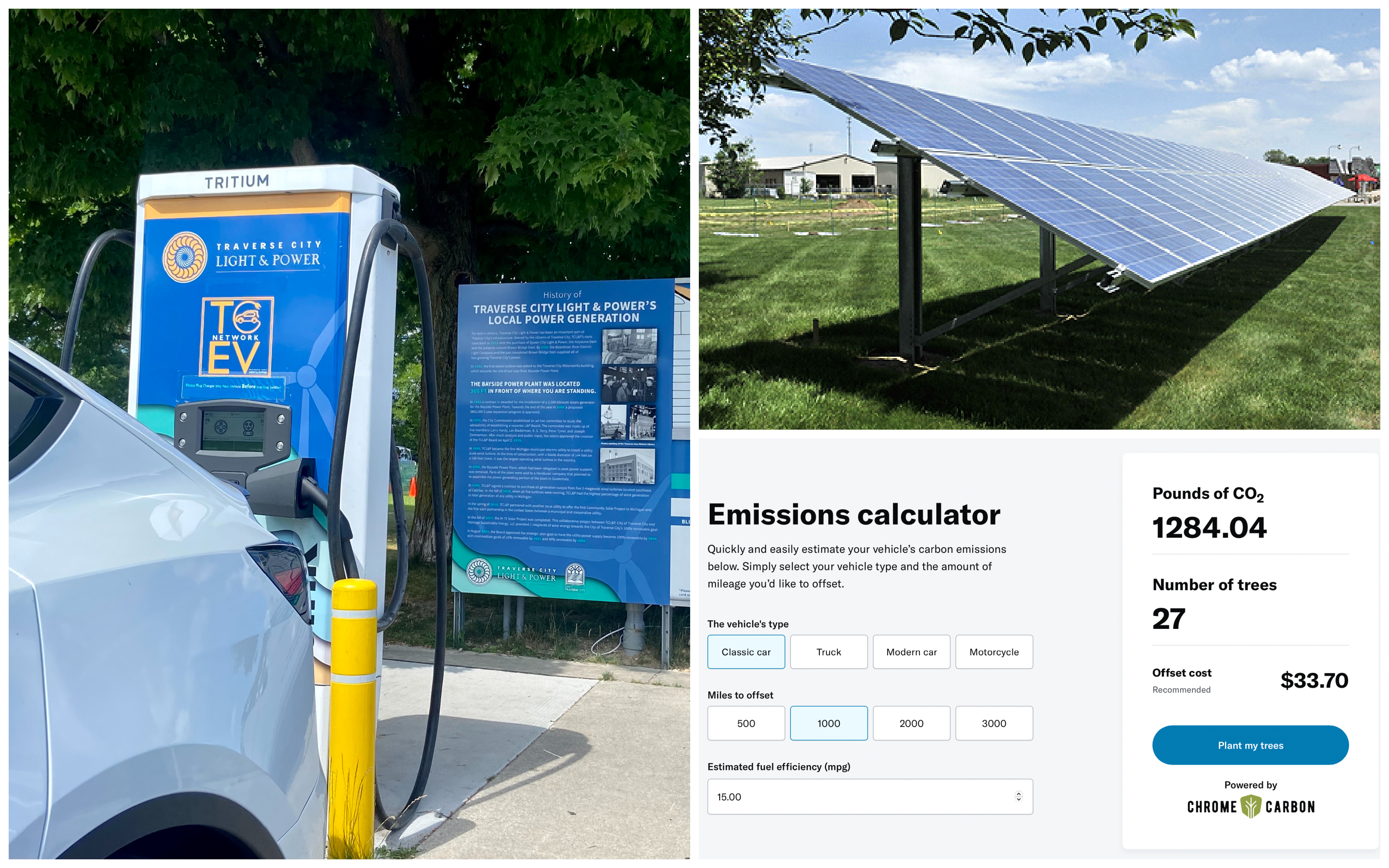
Businesses, City, Utilities Ramp Up Efforts To Go Green
By Beth Milligan | Jan. 27, 2023
Hagerty, Interlochen Center for the Arts, the City of Traverse City, and multiple utilities are among the local organizations ramping up efforts to go green – from introducing carbon offset programs that reduce the footprint of collector cars to powering campuses with clean energy to investing in climate-resilient infrastructure.
Hagerty announced the launch of a new program Thursday called ECO, a voluntary Enthusiast Carbon Offset program “to help motorists reduce the carbon footprint of their collectible cars, trucks, and motorcycles,” according to the company. ECO allows collectible vehicle owners to monitor their CO2 emissions by entering their vehicle type and mileage into an online emissions calculator (pictured, bottom right). Owners can then offset their emissions by paying to plant trees locally in the U.S, Canada, and U.K. The calculator is backed by reforestation program Chrome Carbon.
“Planting trees is one of the most impactful and affordable ways of taking CO2 out of the atmosphere and restoring natural habitat,” according to Hagerty. “Chrome Carbon partners with organizations working closely with national forest agencies, local forest experts, and farmers, making sure that the right trees are planted and looked after in the most relevant locations.” ECO is open to any collectible vehicle owners for participation, even non-Hagerty customers.
Hagerty sees ECO as the “first step” in a company strategy – called Hagerty Impact – to encourage car enthusiasts “to drive positive change across a range of social and environmental activities.” The company says it will lead by example, including offsetting all emissions from its classic fleet and driving events. For 2022, this included the California Mille and Greenwich Concours Driving Tour. Hagerty CEO McKeel Hagerty says the “love of driving and the love of our planet can and must co-exist,” adding: “As part of our long-term environmental strategy, we are committed to helping automotive enthusiasts responsibly make a difference with simple and affordable steps such as this program.”
Other organizations are also putting greater emphasis on their environmental footprints. Interlochen Center for the Arts announced this month it will power nearly one-third of its campus operations with clean energy in the next decade. Working through Consumers Energy’s Large Customer Renewable Energy Program, Interlochen plans to source 30 percent of its annual energy from Michigan-based renewable projects. The school’s commitment is a catalyst for Consumers Energy developing a new solar project, with Interlochen to be a subscriber once the project is up and running.
In 2016, Interlochen trustees adopted a resolution to “create an environmentally friendly and sustainable campus.” Since then, the school has built a botanical lab and community garden; initiated campus-wide recycling and composting programs; installed water-saving appliances and restroom fixtures; established sustainability education programs for Interlochen students and the public; and donated thousands of pounds of organic fruits and vegetables to a local food pantry. In 2019, the United States Department of Education designated Interlochen a Green Ribbon School. The school plans to release its first-ever formalized climate action plan at the end of this year. President Trey Devey says Interlochen is “thrilled to bring clean, renewable energy to our campus,” calling the organization’s pledge “an important next step in our sustainability journey."
Utilities – long driven by fossil fuels like coal – are among the entities taking the hardest look at their futures in a landscape shaped by climate change. Consumers Energy – Michigan’s largest energy provider, serving 6.8 million of Michigan’s 10 million residents – plans to close all of its coal-fired plants by 2025 and become carbon neutral by 2040. As part of its Clean Energy Plan, Consumers says it plans to reach out to both communities and land owners across Michigan in 2023 to identify sites for hosting “professionally constructed solar-generating projects.” The utility also continues to expand its energy-efficiency and Home Energy Analysis programs for customers, as well as invest in electric vehicle-charging infrastructure and incentives as part of a commitment to power one million EVs in the state by 2030.
Cherryland Electric Cooperative says it is leading Michigan with its renewable and carbon-free energy portfolios, with members served by energy that is 62 percent carbon-free (19 percent of which is from renewable sources). The company lays claim to Michigan’s first utility-scale wind farm and first community solar array and offers customers the option to participate in three clean energy programs: community solar, buy-all sell-all, and net metering. In October, nonprofit Leelanau Energy was awarded $60,000 in American Rescue Plan Act (ARPA) funding to help expand Cherryland’s low-income community solar program by purchasing community solar subscriptions on behalf of Leelanau Township members in need of financial assistance.
Traverse City Light & Power (TCLP) is working this year to develop a Climate Action Plan to “identify innovative utility solutions designed to reduce our carbon impact while protecting grid resiliency,” according to the utility. A new website created for the project – TCLPCAP.org – states that “while TCLP is aware of the ongoing debate as to the reality or severity of ‘climate change,’ its actions and goals demonstrate its value for climate health. TCLP desires to determine and strategize its role as an active participant in climate health in a manner that allows it to sustain utility business and services while being mindful of its impact to all people, its financial viability, and the planet it shares.”
To help develop the plan, TCLP is hosting a series of public open houses focused on creating a “strategy for a clean energy future” (the next events will be March 15 and April 5 from 4pm-6pm at Traverse Area District Library). The Climate Action Plan will go to the TCLP board for approval this spring, followed by a public unveiling. Earlier this month, TCLP Executive Director Brandi Ekren presented board members with an in-depth overview of industry trends related to climate change, including demand-based pricing, integrated utility programs, and vehicle and building electrification.
The timing and cost of transitioning to some of those trends – like widespread building electrification – still poses a challenge for organizations and communities planning for the future. In the City of Traverse City, Commissioner Tim Werner has pushed for the adoption of a new city policy that would require all new buildings built on city-owned property to be fully electrified. The policy would also require any privately owned buildings that qualify for a city payment in lieu of taxes (PILOT) agreement to be fully electrified, and all vacant city property that is sold or leased to be deed restricted for full electrification. While several commissioners agreed that addressing climate change is a top priority and supported the policy in theory, they had questions about the logistics, cost, and impact of its immediate implementation. The city – which achieved its goal in 2020 of using clean energy for all of its own metered operations and is aiming to use 100 percent renewable energy community-wide by 2040 – will revisit the building electrification policy this spring, along with recommendations from the city’s Green Team.
Traverse City’s efforts to invest in climate-resilient infrastructure – including plans to invest $48 million into the city’s water and wastewater systems over the next five years – echo larger statewide plans. In her State of the State Address Wednesday, Governor Gretchen Whitmer highlighted infrastructure and climate as two priorities in 2023 “that impact us all,” hinting that those will be key parts of her budget proposal this year. “It is our shared duty to face climate change head-on and protect our land and water,” Whitmer said. “We must pursue climate action while creating jobs, lowering costs, and becoming a hub of clean energy production. Last year, we unveiled the MI Healthy Climate Plan, and this year, we should make bold investments in climate action to deliver on its targets. Let’s get it done.”
Comment






